The battle to contain the worst U.S. measles outbreak in 27 years has a new front: summer camp.
Vaccinations have been made mandatory this summer for campers and staff in several counties north of New York City that annually fill up with kids from the Orthodox Jewish communities that have been hit hardest by measles.
Ulster County took the extra step of mandating the measles vaccine or proof of immunity at all day camps and overnight camps, becoming the latest county in the area to issue immunization requirements. Rockland County announced a similar order this month, following mandates from Sullivan and Orange counties.
"We have to make sure our t's are crossed and our i's are dotted in making sure all these vaccination records are in and have been fine-combed through to make sure everything is in compliance," said Rabbi Hanoch Hecht, of Ulster County's Camp Emunah, which hosts many girls from a Chabad community in Brooklyn's Crown Heights.
"In the past where we accepted religious exemptions for certain things," said Hecht, who is getting his own blood checked for immunity, "now we cannot."
The state of New York requires summer camps to keep immunization records for all campers, but doesn't bar children from attending if they haven't gotten a measles shot.
Children are required to get the measles vaccine to attend schools in New York, however, and Gov. Andrew Cuomo signed legislation Thursday eliminating an exemption for kids whose parents object to vaccinations on religious grounds.
The Centers for Disease Control and Prevention reported that, as of June 1, more than 1,000 measles cases had been reported in the U.S. since the start of the year, up from fewer than 100 cases a year a decade ago. The bulk of those cases have been diagnosed in ultra-Orthodox Jewish neighborhoods in Brooklyn and suburban Rockland County.
The CDC recommends everyone over a year old should get the vaccine, except for people who had the disease as children. Those who have had measles are immune.
The vaccine, which became available in the 1960s, is considered safe and highly effective — paving the way for measles to be declared all but eliminated in the U.S. in 2000. But it has had a resurgence several times, including 667 cases in 2014.
Hecht and others stressed that vaccinations are widely accepted by most members of the Orthodox community, echoing rabbis in Brooklyn and Rockland County who say it is a relatively small group of parents influenced by anti-vaccination propaganda — not religious teachings — who have resisted inoculations.
The Orthodox Union said it has previously required up-to-date vaccinations, including the MMR vaccine, for its 37 summer programs.
"Most of the leaders and rabbis have taken the approach that vaccination is required," Hecht said.
Health officials in New York City have taken a tough approach, making measles vaccinations mandatory for everyone living in the Brooklyn neighborhood that is the epicenter of the outbreak, fining people for failing to get inoculated and closing 12 schools for failing to exclude staff and students who couldn't document immunity. The city announced the two most recent closures Thursday.
Now, as schools prepare to close down for the summer, the fight is spreading into the Catskills and Hudson River Valley.
Sullivan County is in the heart of the traditional Borscht Belt, and the lake-laden area still attracts thousands to its camps and bungalow colonies each summer. Of the 170 state-regulated camps in the county, 139 are Orthodox Jewish camps.
"We draw such a population from New York City, where this measles outbreak was," Sullivan County spokesman Dan Hust said. "It was considered prudent and wise."
Not everyone agrees. The orders from Sullivan and Orange counties were challenged in state courts by parents of various religious faiths. However, civil rights attorney Michael Sussman said Friday he believes those cases will have to be withdrawn given New York's removal of religious exemptions.
Several camp administrators interviewed by The Associated Press expressed no objection to mandatory vaccinations.
"We have no issue with that," said Yoel Landau, director at Camp Rav Tov, a camp for Hasidic boys in Monticello. Landau said schoolboys from New York City attending the camp should have already been vaccinated because of the city's order in April.
Rabbi Dovid Teichman, director of Camp Govoah, which caters to Orthodox campers in rural Greene County, said staffers were "combing through each and every application to make sure that everyone is vaccinated."
"I can't jeopardize anybody," he said. "So if I find somebody that's on the list that's not vaccinating, I'm not taking them into camp."
UNITED NATIONS (AP) — The United States vetoed a widely backed U.N. resolution on Thursday that would have paved the way for full United Nations membership for Palestine, a goal the Palestinians have long sought.
The vote in the 15-member Security Council was 12 in favor, the United States opposed and two abstentions, from the United Kingdom and Switzerland. U.S. allies France, Japan and South Korea supported the resolution.
The resolution would have recommended that the 193-member General Assembly, where there are no vetoes, approve Palestine becoming the 194th member of the United Nations. Some 140 countries have already recognized Palestine, so its admission would have been approved, likely by a much higher number of countries.
U.S. deputy ambassador Robert Wood told the council the U.S. veto “does not reflect opposition to Palestinian statehood, but instead is an acknowledgment that it will only come from direct negotiations between the parties."
Before the vote, U.S. deputy State Department spokesman Vedant Patel said the United States has “been very clear consistently that premature actions in New York — even with the best intentions — will not achieve statehood for the Palestinian people.”
This is the second Palestinian attempt for full membership and it comes as the war in Gaza has put the more than 75-year-old Israeli-Palestinian conflict at center stage.
Palestinian President Mahmoud Abbas first delivered the Palestinian Authority’s application for U.N. membership in 2011. That bid failed because the Palestinians didn’t get the required minimum support of nine of the Security Council’s 15 members.
The Palestinians then went to the General Assembly, and by more than a two-thirds majority succeeded in having their status raised from a U.N. observer to a non-member observer state in November 2012. That opened the door for the Palestinian territories to join U.N. and other international organizations, including the International Criminal Court.
The strong support the Palestinians received Thursday reflects not only the growing number of countries recognizing their statehood but almost certainly the widespread global support for Palestinians caught in the war in Gaza, now in its seventh month.
Algeria’s U.N. Ambassador Amar Bendjama, the Arab representative on the council who introduced the resolution, called Palestine’s admission “a critical step toward rectifying a longstanding injustice" and said that “Peace will come from Palestine’s inclusion, not from its exclusion.”
In explaining the U.S. veto, Wood said there are “unresolved questions” on whether Palestine meets the criteria to be considered a state. He pointed to Hamas still exerting power and influence in the Gaza Strip, which is a key part of the state envisioned by the Palestinians.
Wood stressed the U.S. commitment to a two-state solution where Israel and Palestine live side-by-side in peace as the only path for both sides to live with security and for Israel to establish relations with all its Arab neighbors, including Saudi Arabia.
“The United States is committed to intensifying its engagement with the Palestinians and the rest of the region, not only to address the current crisis in Gaza, but to advance a political settlement that will create a path to Palestinian statehood and membership in the United Nations,” he said.
Ziad Abu Amr, special representative of the Palestinian president, said adopting the resolution would grant the Palestinian people hope “for a decent life within an independent state.”
He stressed to the Security Council that it wouldn't be an alternative “for serious negotiations that are time-bound to implement the two-state solution” and U.N. resolutions, and to resolve pending issues between Palestinians and Israelis.
“To grant the state of Palestine full membership will be an important pillar to achieve peace in our region, because the Palestinian-Israeli conflict and its different dimensions now goes beyond the borders of Palestine and Israel and impacts other regions in the Middle East and around the world,” the Palestinian envoy said before the vote.
Israeli-Palestinian negotiations have been stalled for years, and Israel’s right-wing government is dominated by hard-liners who oppose Palestinian statehood.
Israeli U.N. Ambassador Gilad Erdan called the resolution “disconnected to the reality on the ground” and warned that it “will cause only destruction for years to come and harm any chance for future dialogue.”
Six months after the Oct. 7 attack by Hamas, which controlled Gaza, and the killing of 1,200 people in “the most brutal massacre of Jews since the Holocaust,” he accused the Security Council of seeking “to reward the perpetrators of these atrocities with statehood.”
Israel’s military offensive in response has killed over 32,000 Palestinians, according to Gaza’s health ministry, and destroyed much of the territory.
Erdan listed the requirements for U.N. membership — accepting the obligations in the U.N. Charter and especially being a “peace-loving” state.
“What a joke,” he said. “Does anyone doubt that the Palestinians failed to meet these criteria? Did anyone hear any Palestinian leader even condemn the massacre of our children?”
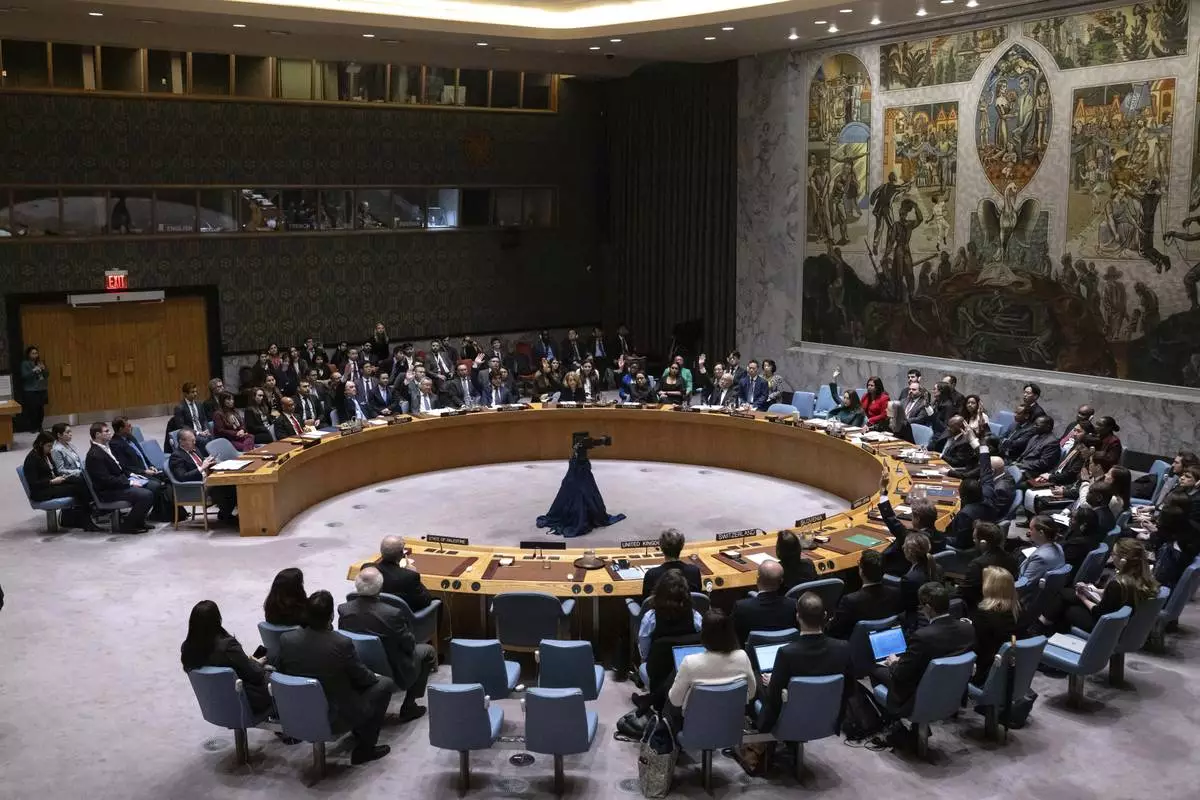
Representatives of member countries take votes during a Security Council meeting at United Nations headquarters, Thursday, April 18, 2024. (AP Photo/Yuki Iwamura)
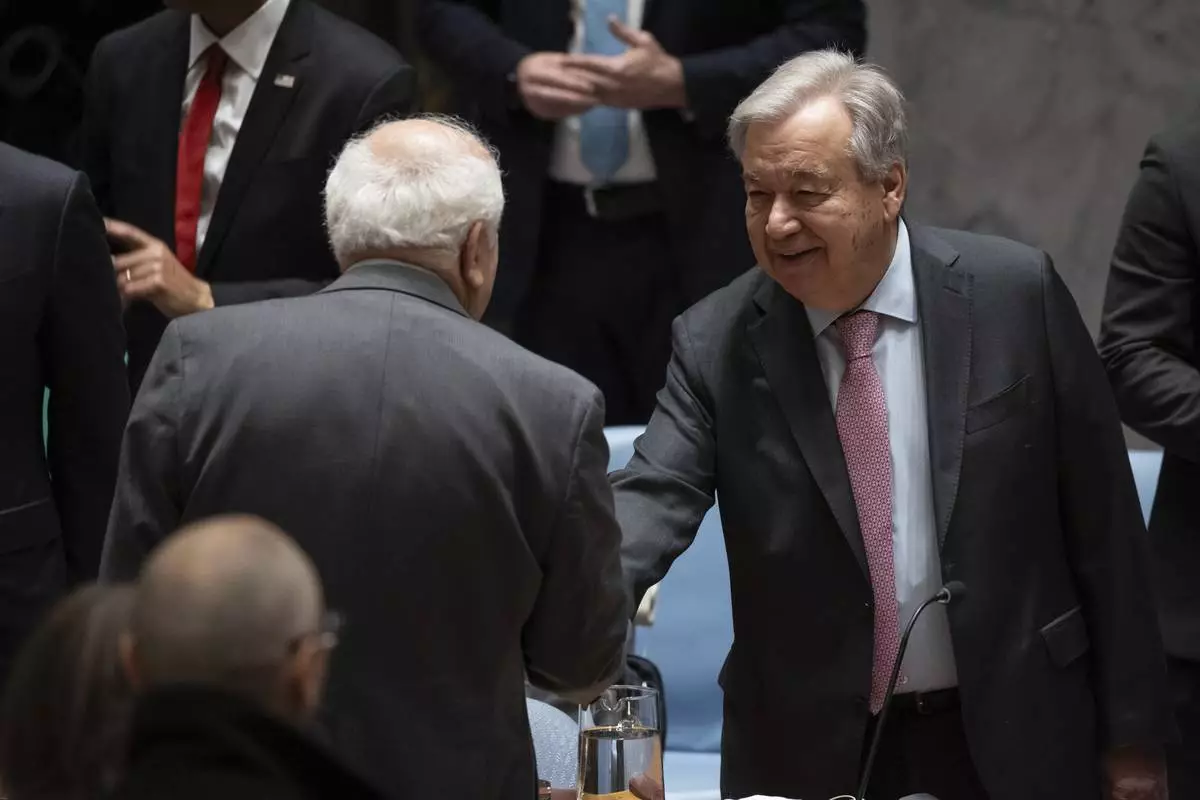
Palestinian Ambassador to the United Nations Riyad Mansour, left, and United Nations Secretary-General Antonio Guterres speak before a Security Council meeting at the United Nations headquarters, Thursday, April 18, 2024. (AP Photo/Yuki Iwamura)
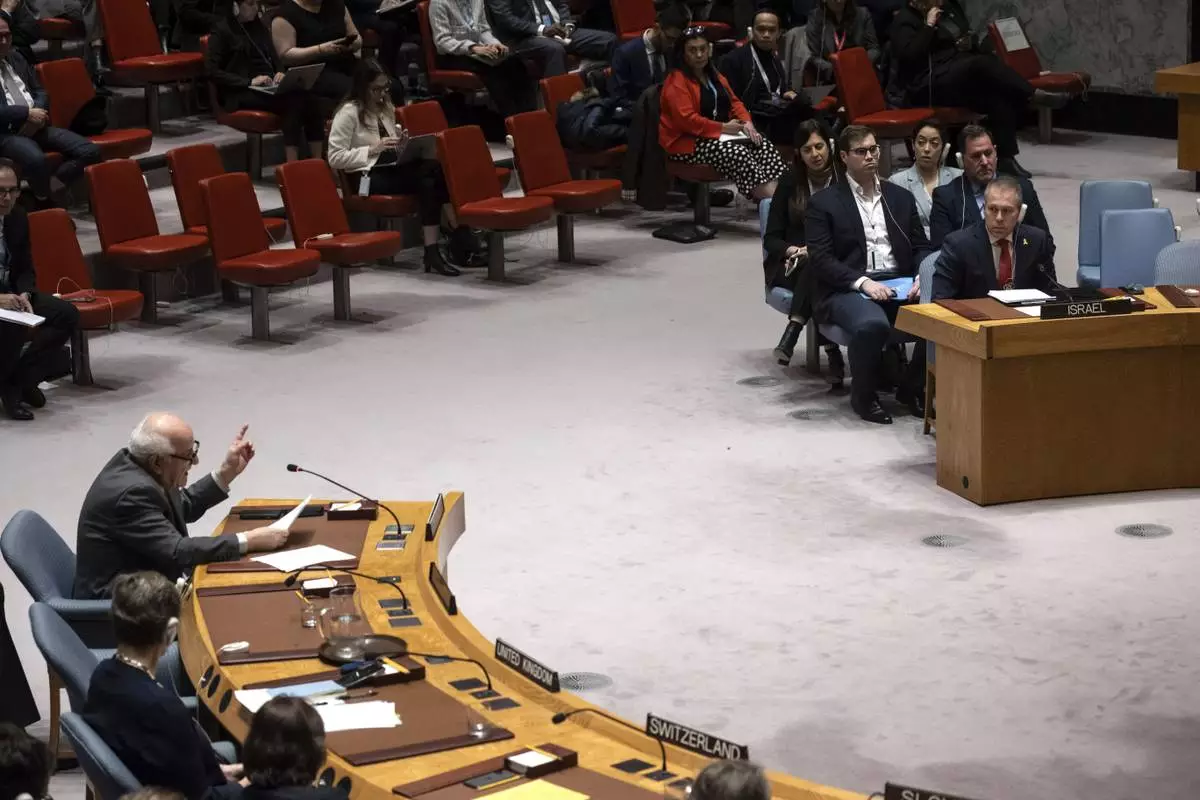
Palestinian Ambassador to the United Nations Riyad Mansour speaks during a Security Council meeting at United Nations headquarters, Thursday, April 18, 2024. (AP Photo/Yuki Iwamura)
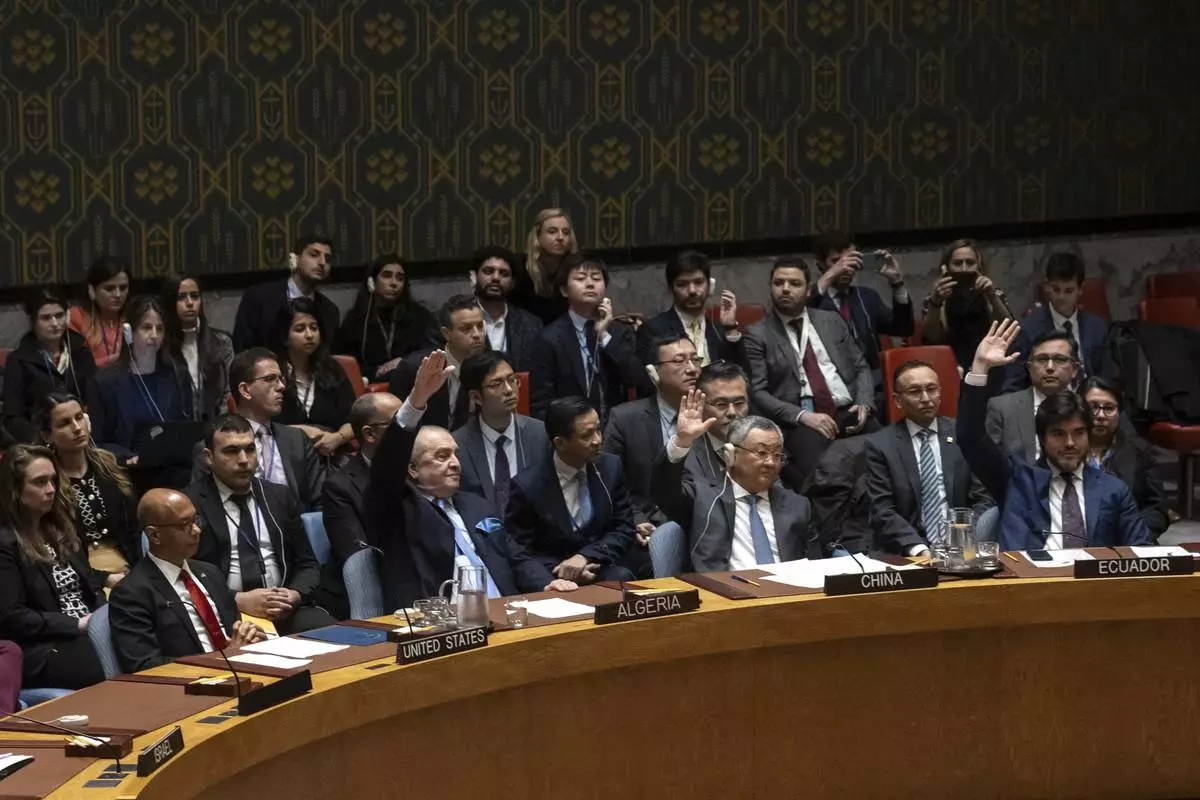
Representatives of member countries take votes during a Security Council meeting at United Nations headquarters, Thursday, April 18, 2024. (AP Photo/Yuki Iwamura)
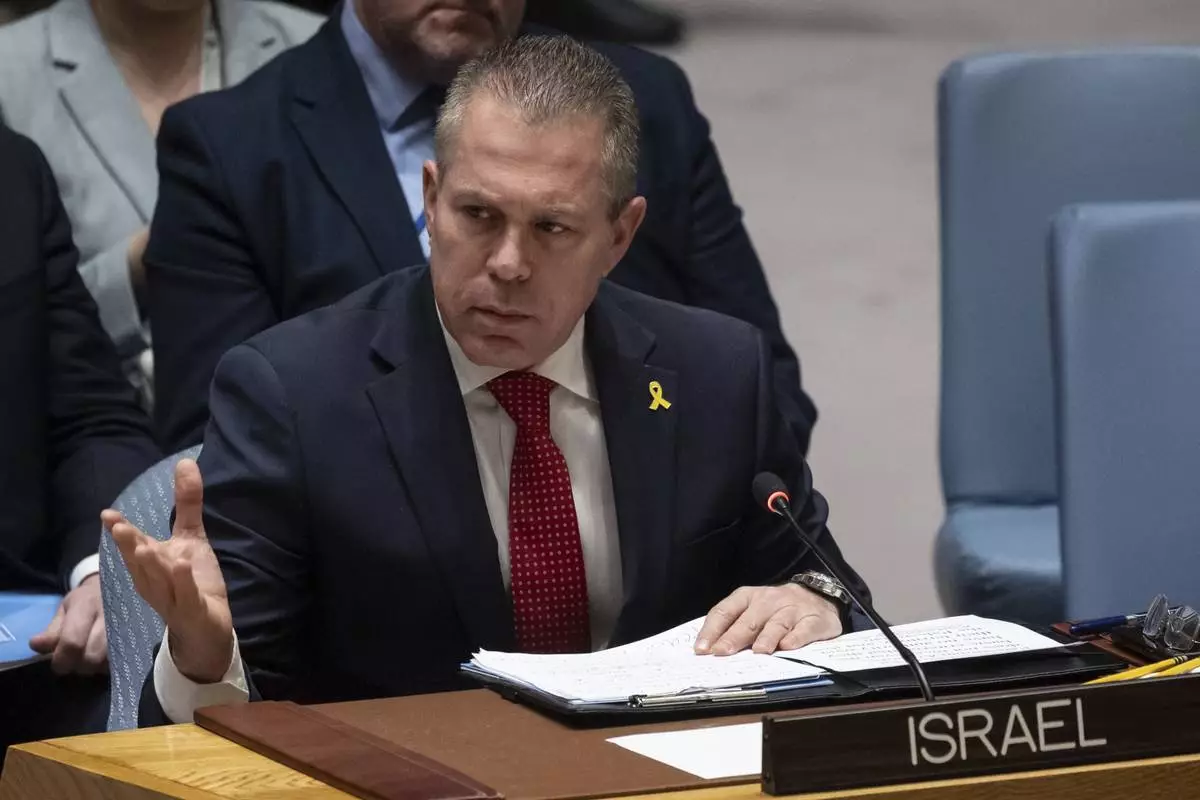
Israeli Ambassador to the United Nations Gilad Erdan speaks during a Security Council meeting at United Nations headquarters, Thursday, April 18, 2024. (AP Photo/Yuki Iwamura)
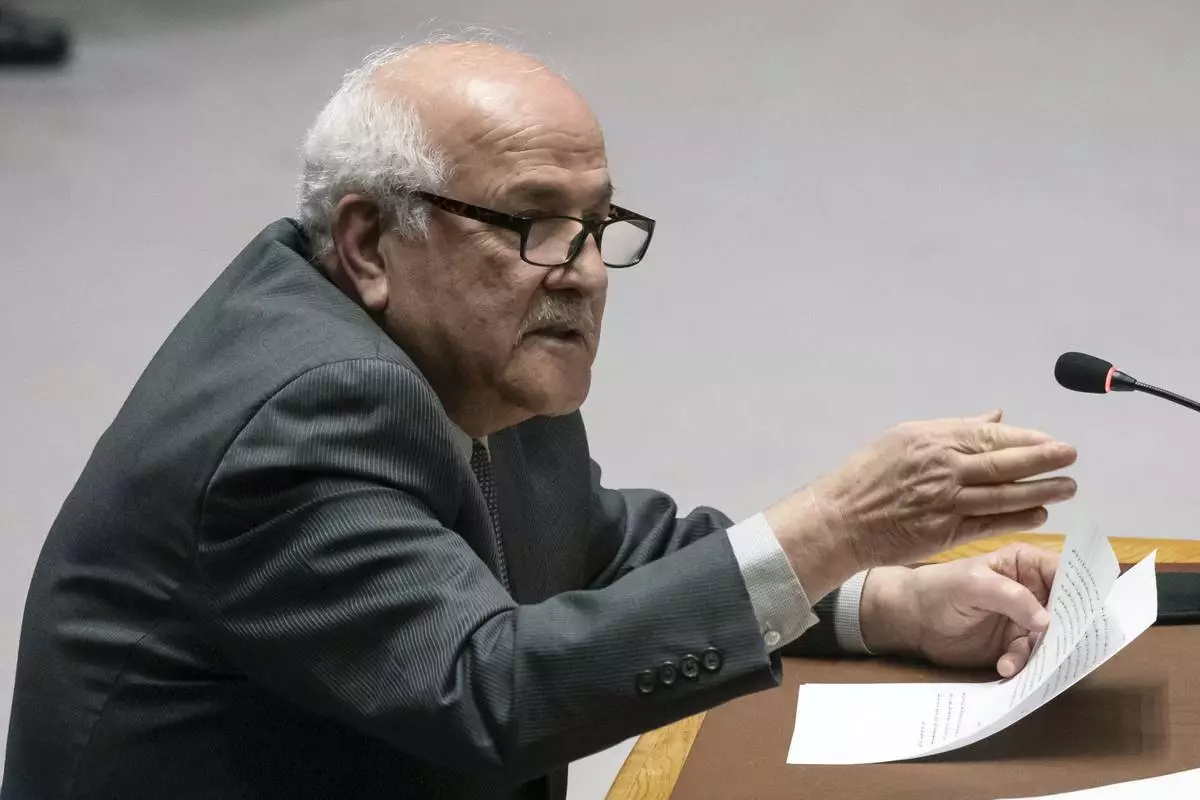
Palestinian Ambassador to the United Nations Riyad Mansour speaks during a Security Council meeting at United Nations headquarters, Thursday, April 18, 2024. (AP Photo/Yuki Iwamura)
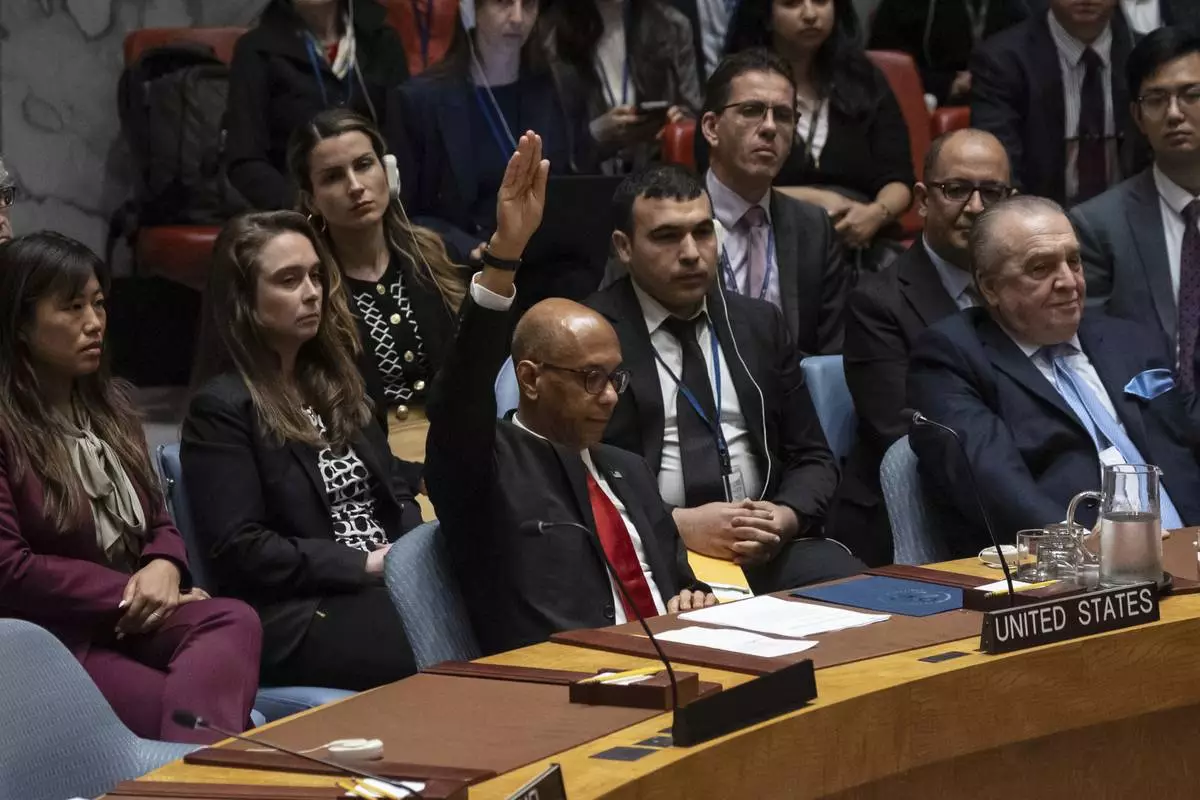
U.S. Deputy Ambassador Robert Wood votes against resolution during a Security Council meeting at United Nations headquarters, Thursday, April 18, 2024. (AP Photo/Yuki Iwamura)
















